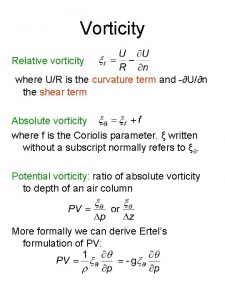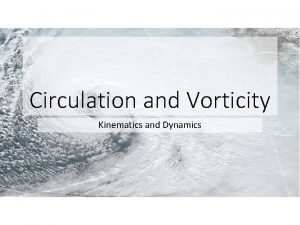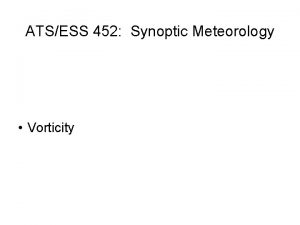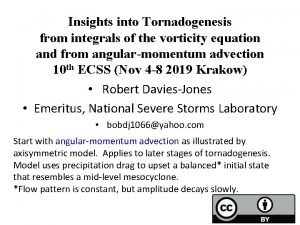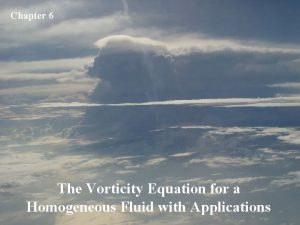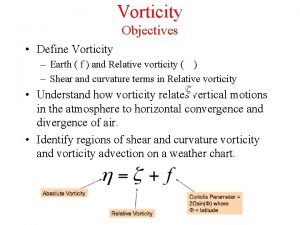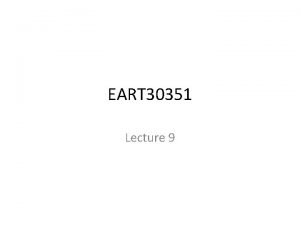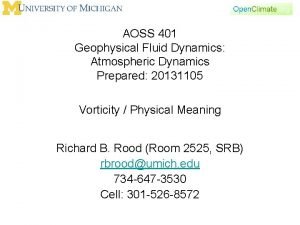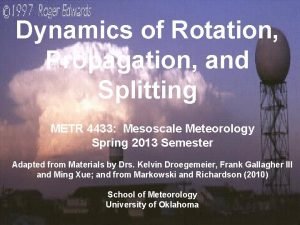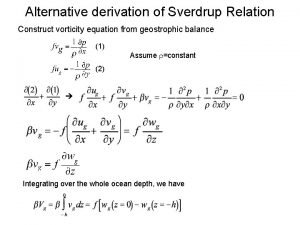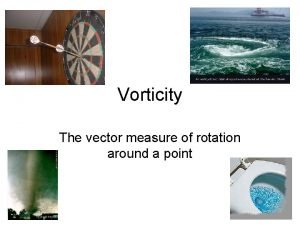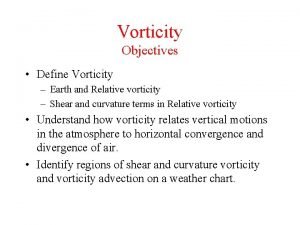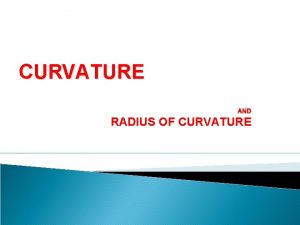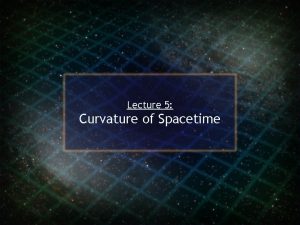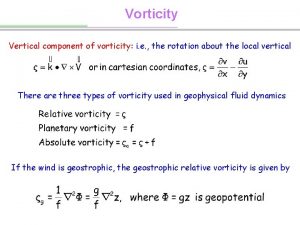Vorticity Relative vorticity where UR is the curvature











- Slides: 11

Vorticity Relative vorticity where U/R is the curvature term and -∂U/∂n the shear term Absolute vorticity where f is the Coriolis parameter. ξ written without a subscript normally refers to ξa. Potential vorticity: ratio of absolute vorticity to depth of an air column More formally we can derive Ertel’s formulation of PV:

Vorticity equation We can derive the barotropic vorticity equation: Which relates stretching to changes in vorticity Ω pt Ω/h conserved h r pb

Dines compensation In the stratosphere vertical motion is inhibited - so ω reaches a maximum in the midtroposphere Divergence at jet stream level => Convergence at the surface This is how the jet stream drives the weather D C D C Tropopause ground

Rossby waves A Divergence U ξr < 0 Convergence B C ξr > 0 Minimum in ξain ridge Maximum in ξa in trough So dξa/dt >0 – ξa increases as air goes from ridge to trough By conservation of PV, air columns must stretch. Stratosphere resists vertical motion so the columns stretch downwards – descending motion between A and B By Dines, this results in divergence at the surface – anticyclone tends to form.

Example Upper tropospheric air flows at a speed of 30 ms-1 through a sinusoidal trough-ridge pattern at 50 o. N, of peak-to-peak amplitude 500 km and wavelength 3000 km. Calculate the change in absolute vorticity between ridge and trough, and derive the fractional change in the depth of an air column as it traverses the pattern. Draw a diagram to mark areas of upward and downward motion in the flow, and hence describe the effect of the pattern on the surface weather. (The radius of curvature of y = A sin(kx) is (Ak 2)-1 at the crests).

Example Upper tropospheric air flows at a speed of 30 ms-1 through a sinusoidal trough-ridge pattern at 50 o. N, of peak-to-peak amplitude 500 km and wavelength 3000 km. Calculate the change in absolute vorticity between ridge and trough, and derive the fractional change in the depth of an air column as it traverses the pattern. Draw a diagram to mark areas of upward and downward motion in the flow, and hence describe the effect of the pattern on the surface weather. (The radius of curvature of y = A sin(kx) is (Ak 2)-1 at the crests). First, calculate Rmax from (Ak 2)-1 A = 250 km, λ=3 x 106 m so k = 2. 09 x 10 -6 m-1 Ak 2 = 1. 09 x 10 -6 m-1 so Rmax =916 km U/Rmax = 3. 28 x 10 -5 s-1 (+ve in trough, -ve in ridge)

1. Absolute vorticity 2. Potential vorticity use 1, with no shear vorticity term (uniform speed). 500 km corr. to 4. 5° lat = ± 2. 25° (1° = 111 km) ftrough (47. 75 ) = 1. 08 10 -4 s-1 so ξa =1. 41 10 -4 s-1 fridge (52. 25 ) = 1. 15 10 -4 s-1 so ξa = 0. 82 10 -4 s-1 Fractional change in depth of air column is calculated using 2. In the straight part of the flow, ξa = f = 1. 12 10 -4 s-1. Since is conserved: . Ω pt h r pb Ω/h conse rved Divergence aloft causes pressure drop Convergence at surface causes cyclone to spin-up

Shear Vorticity on left side of jet n A Jet B Isotachs (const. wind speed) on right side of jet Convergence Divergence Jet Convergence

Example A zonal jet streak develops in a uniform zonal flow of 30 m s-1 at 60°N. The jet has a maximum speed of 80 m s-1. The cyclonic side is 200 km wide and the anticyclonic side 600 km wide. If the initial depth of a column of air which enters the jet is 100 mb, use the barotropic vorticity equation to estimate its depth at maximum velocity if it is positioned: (i) poleward of the jet core (ii) equatorward of the jet core (iii) directly upstream of the jet core. What limits the accuracy of these estimates?

30 ms-1 (i) 30 ms-1 200 km 80 ms-1 30 ms-1 J 600 km (ii) 30 ms-1 (i) Shear vorticity = -∂U/∂n = (80 -30)/(200 x 103) = 2. 5 x 10 -4 s-1 f = 1. 26 x 10 -4 s-1 so absolute vorticity = 3. 76 x 10 -4 s-1 Applying conservation of PV = ξa /Δp, so Δp at (i) is (3. 76/1. 26)*100 = 298 mb (ii) No change in vorticity along axis of jet so no change in Δp iii. Shear vorticity = -∂U/∂n = (80 -30)/(600 x 103) = 0. 833 x 10 -4 s-1 f = 1. 26 x 10 -4 s-1 so absolute vorticity = 0. 427 x 10 -4 s-1 Applying conservation of PV = ξa /Δp, so Δp at (i) is (0. 427/1. 26)*100 = 34 mb

Curved jet streams C, D : convergence/divergence due to trough or ridge C, D : convergence/divergence due to jet entrance/exit Diffluent trough Confluent trough D D D C Black arrow denotes jet axis (location of wind maximum) C D C C Diffluent ridge C D Confluent ridge
